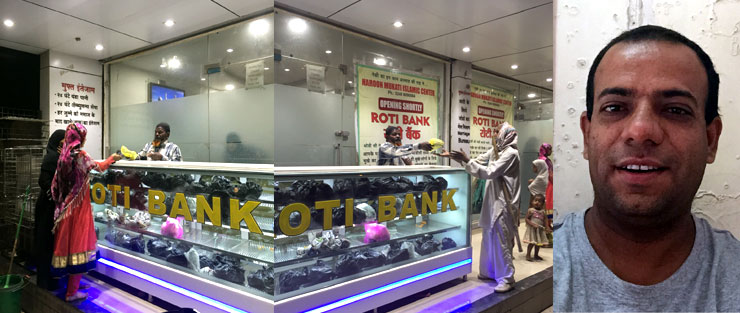A Roti, Kapda,Paani Bank? Meet Yusuf Mukati

A year and a half ago, Yusuf Mukati and his sisters founded the Haroon Mukati Islamic Centre (HMIC) named after his late father. Mukati never thought that his organisation and initiatives would one day become a household name in Aurangabad.
Started as an organisation to educate destitute girls, HMIC has grown to provide not only education, but also food and clothes to the poorest of the poor. In this short span of time, HMIC has educated over 21,500 girls in Aurangabad in over 15 varied courses. Mukati says that we tried to provide all the facilities to these girls. Their “teachers were well qualified” and classrooms “air conditioned.”
Mukati realized that due to acute poverty, most of his students were unable to afford even one square meal a day. This motivated him to look into the matter, as a result of which he interviewed his students to know more about this problem.
He told The Citizen that: “I was surprised to find out that some poor households cook only one meal a day and others cooked only one meal in two days. This was all that they could afford, while people like us have the privileged to afford three meals a day.”
Moved by this tragic truth of our time, he went from house to house asking people to become registered members and send cooked food to their centre. Thus, the Roti Bank was born. Started in December, 2015, Roti Bank has been growing with tremendous speed. It successfully feeds 500 deprived mouths daily.
The process is systematic and simple. People have to fill up a form for the Roti Bank’s membership. A specific code number is allotted to them, after which they have to deliver a minimum of two freshly cooked rotis and a plate of vegetarian or non vegetarian dish.
People can voluntarily deposit food and the needy can simply withdraw food.
Mukati further adds, “due to an increase in membership, we had to purchase 3 refrigerators each one with a capacity to holds 6 ton of food.”
Many people are contributing to Mukati’s initiative to transform the dream that consumption of food has become for the unfortunate, into a reality; with a number of hotels and wedding caterers depositing food in the bank.
Mukati also told The Citizen that, “we have 12 autos that move around the city to distribute food to those who cannot come to the bank. We will soon launch a service through which people can call us, and we will collect food from them from any corner of the city within 20 minutes.”
Noticing that many people who came to collect food at the bank barely had enough clothes, Mukati decided to launch the Kapda Bank which had a similar procedure.
The idea behind the Kapda bank, as Mukati recalls is “if there are 25 pair clothes that one possesses, there will be at least 2 pairs out of those 25 that they do not wear; we request them to donate those 2 pair at the bank.”
The Kapda Bank which was launched in January 2015 has been very successful. The bank donated 4000 clothes to the Ghati Hospital in Aurangabad and 10000 clothes to Naregeon, village near Aurangabad. Mukati has also requested garment stores to donate their old stock to them. As a result of the effort of countless concerned souls, the Kapda Bank is on target to donate 25000 clothes this year.
In order to make food and clothes more reachable to the hungry and the bare skinned, Mukati plans to hire 3 autos which will move around the city to fulfill this motive. He calls this initiative ‘Awaaz do, roti ya kapda lo’.
Sharing his vision of the ‘Paani Bank’ Mukati says that with this initiative he plans to donate a bottle of filtered water to 4000 people daily free of cost. The process for the same has already commenced and will be launched next month.
As a message for the citizens of the country Mukati strongly believes that “it is the responsibility of the rich and the privileged members of the society to take care of the poor and underprivileged.”
In a country where more than 3000 people die every day due to starvation and 31.8% of the population who do not have basic necessities like clothing, unsung heroes like Yusuf Mukati, take it as their duty to contribute their bit.
And, as they say, one change can make this a better place. Let us all try to be that change.



